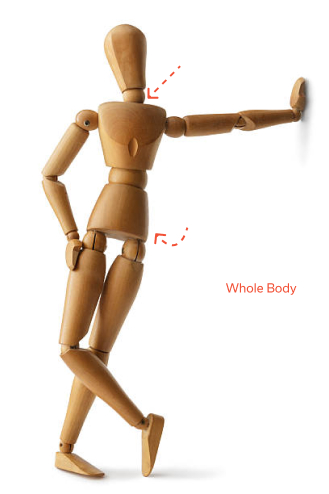PHYSIOTHERAPY Articles
Farewell 2023 and Hello 2024
2023 has gone so quickly and 2024 is already here - some thoughts that's on my mind, looking back at 2023 and looking forward.
Chiropractic vs Physiotherapy: Which is Better?
When it comes to seeking treatment for musculoskeletal issues or pain, two commonly sought-after professions are chiropractic and physiotherapy.
Manual Therapy (Physiotherapy): All You Need to Know
In this article, we will explore what manual therapy is, the various techniques practised, and who can benefit from such treatment.
What is the Difference Between Shockwave Therapy vs Ultrasound Therapy?
Physical medicine has evolved significantly, introducing various advanced treatment modalities for healing and pain relief.
Hand Therapy Articles
Muenster Splint versus Sugar Tong Splint
The Muenster splint and the Sugar Tong splint are two very important splints that help prevent full wrist / forearm rotation (pronation and supination).
Triangular Fibrocartilage Complex (TFCC) Wrist Injuries
Our triangular fibrocartilage complex (or TFCC / TFC, for short), refers to a very complex cartilage structure that's located at the wrist area that's close to your little finger.
De quervain's tenosynovitis
De Quervain's tenosynovitis is also commonly known as washerwoman's sprain, mummy thumb, or blackberry thumb.
Radial nerve palsy hand therapy
What is radial nerve palsy hand therapy?
Alternative Articles
Manual lymphatic drainage therapy
Manual lymphatic drainage therapy is a form of massage that facilitates and accelerates natural lymphatic circulation through our entire body.
Flexibility and stretch physiotherapy
If you improve your flexibility and stretching ability, you will improve your strength, balance, stability and more.
Craniosacral Therapy Singapore
Cranial Sacral Therapy is a soft and gentle, but powerful, healing technique that deals with important mechanics in our body and head.
Traditional Chinese Medicine Treatment Articles
Acupuncture
Acupuncture is a very common Traditional Chinese Medicine treatment in Singapore (as well as Asia, particularly China and Japan).
Chinese Herbal Medicine
Each of us has a unique body constitution, which is influenced by hereditary traits, environmental factors and lifestyle habits.
Rehab Articles
Spinal decompression traction therapy
Spinal decompression traction therapy refers to a computerized, safe, accurate and gradual method of providing decompressive traction forces to your back for pain relief.
Custom Pain-relief Insoles (Singapore)
Revolutionary custom orthotics 3D printed orthotic insoles to fit your feet perfectly to relieve foot and joint pain and prevent future biomechanical issues.
Ultrasound physiotherapy
Ultrasound can help accelerate both soft tissue and hard tissue healing
Extracorporal Shockwave Therapy (ESWT)
Shockwave therapy treatment is non-invasive and produces an inflammatory response, which will increase metabolic activity around the site of pain.
Physiotherapy For Upper Back Pain Articles
Natural Home Remedies for Back Pain: Effective Solutions for Relief
Physiotherapy For Shoulder Pain Articles
Finding Shoulder Blade Pain Relief: Strategies and Exercises
Comprehensive Shoulder Pain Diagnosis Chart
How to Ease Shoulder Pain: Effective Relief Strategies
Managing Bench Press Shoulder Pain: Tips for a Pain-Free Workout
Physiotherapy for Knee Pain Articles
Top Stretches for Knee Pain: Techniques for Soothing Discomfort
Understanding Knee Pain in Women: Causes and Management
Addressing Sharp Knee Pain: Identifying Causes and Seeking Relief
Understanding Lateral Knee Pain: Causes and Treatment Options
Physiotherapy For Slipped Disc Articles
Cervical Herniated Disc Relief: Understanding Causes and Treatments
Sleeping Positions for Slipped Disc Relief: Minimizing Discomfort
Yoga for Slipped Disc Recovery: Gentle Exercises for Healing
Targeted Exercises for Relieving Herniated Disc Pain
Physiotherapy For Lower Back Pain Articles
Managing Back Pain After Running: Tips for Recovery and Prevention
Physiotherapy Exercises for Lower Back Pain: Rehabilitation Techniques
Addressing Lower Back Pain While Walking
Easing Lower Back Discomfort After Sleep
Physiotherapy for Neck Pain Articles
Alleviating Left-Sided Neck and Shoulder Pain
Relief for Neck Pain After Waking Up - Causes and Solutions
Neck pain after sleeping can significantly impact a person's quality of life. Severe neck and shoulder pain, for instance, are associated with poor health perception due to lower sleep quality.
Neck Pain Relief: At-Home Neck Pain Exercises
In this article, we'll explore some simple and safe neck pain relief exercises you can do right from the comfort of your home.
Physiotherapy for Back Pain Articles
Rise Without Pain: Tackling Upper Back Discomfort in the Morning
Navigating Middle Back Pain: Practical Tips for a Pain-Free Life
Sneezing and Back Pain: Understanding the Connection
Left-Side Middle Back Pain: Navigating Causes and Morning Solutions
To view all articles, browse our entire article index here.
Browse article indexPhoenix Rehab: Where you regain the life you love
Singapore's most experienced and trustworthy physio and hand therapy specialists who are dedicated experts in diagnosing and treating pain and injuries in bones, muscles, ligaments, tendons and joints.
 PHYSIOTHERAPY
PHYSIOTHERAPY
 Hand Therapy
Hand Therapy
 Alternative
Alternative
 Massage
Massage
 Traditional Chinese Medicine Treatment
Traditional Chinese Medicine Treatment
 Rehab
Rehab

 Whatsapp us now
Whatsapp us now